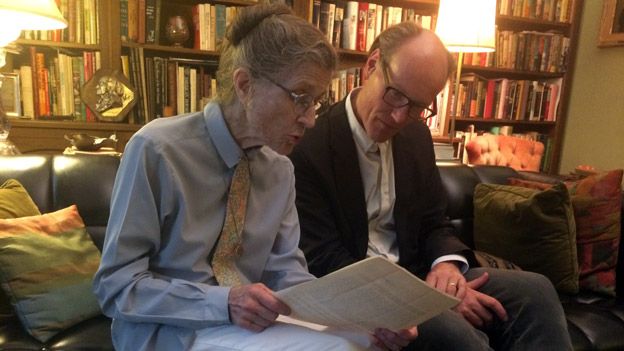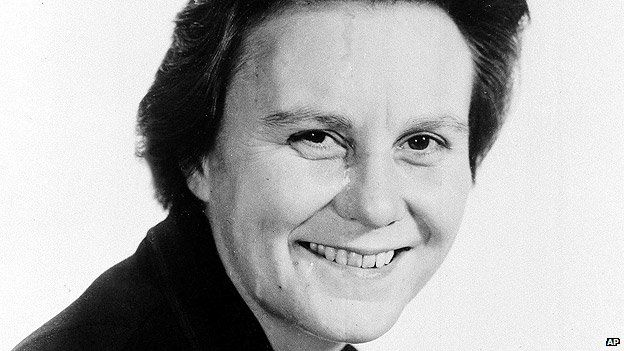Author Harper Lee had plans to write a string of novels after To Kill A Mockingbird, according to a letter she wrote before the book was published.
In the letter, sent two years before To Kill A Mockingbird came out in 1960, she listed six ideas that she thought would occupy her for the next 15 years.
But she has not written a full novel since To Kill A Mockingbird’s success.
However a manuscript she wrote before that book, Go Set A Watchman, has been found and will be published next week.
Lee wrote Go Set a Watchman in the mid-1950s – but her editor persuaded her to turn some of the story’s flashback sequences into a separate novel.
That novel became To Kill A Mockingbird, which went on to win the Pulitzer Prize in 1961 and is regarded as one of the greatest novels of the 20th Century.
In 1958, she wrote to her friend Joy Brown who, along with her husband Michael, had given her money to leave her job and focus on writing.
Lee told them she was trying to finish “My Novel”. She described it as “the hardest damn thing to write I’ve ever attempted” and added: “I’m about six weeks’ gone with another one.”
Lee then went on to list ideas for future books. “I have my work cut out for me for the next fifteen years:
- (1) Race Novel
- (2) Victorian Novel
- (3) What Mr Graham Greene calls An Entertainment
- (4) I’m gonna tear Monroeville to pieces (1958 Monroeville)
- (5) A Novel of The United Nations
- (6) India, 1910
“Can you feed and lodge me so long?” Lee then asked.
‘Sell this to the movies’
The first idea “Race Novel” was in keeping with the themes of both To Kill A Mockingbird and Go Set A Watchman, which document racial tension in the southern US.

Joy Brown showed BBC arts editor Will Gompertz the letter
Mrs Brown said the author was interested in the Victorian era, and the third idea refers to Graham Greene’s nickname for his less serious works.
The fourth signals her intention to write about her home town of Monroeville, Alabama.
Of the final idea, she wrote that her agent Annie Laurie Williams would “sell this to the movies”.
“The heroine will be named Portulaca Brown, an Anglo-Indian,” she wrote. “She will have all her teeth, and they will gleam beautifully in Technicolor on a Stethoscopic Screen. There will be a Plot.”
Lee and Brown had and still enjoy a close friendship, and the author went on to provide what may have been a light-hearted outline.
“Portulaca Brown, an Anglo-Indian, is dissatisfied with her lot,” she wrote. “She wants to be either Anglo or Indian. Dissatisfied with her marriage to Lord Kinloch Kinloch of Loch Kin, Outer Hebrides, she joins Lady Clementine Pankhurst in a Movement.”
She signed the letter Nelle, her first name. Harper is her middle name.
The reasons for Lee’s withdrawal from the spotlight have long been the stuff of literary mystery and conjecture. She has largely avoided the spotlight since the 1960s.
‘Overwhelmed’ by success
In an interview with BBC arts editor Will Gompertz, Mrs Brown said: “I have a letter from her saying she has a whole list of six or seven things she’s going to do – what she’s going to write.”

Harper Lee retreated from the spotlight after the 1960s
“She said, ‘This is going to occupy me for the next 15 years’. So she didn’t stop writing or thinking about it all of a sudden, in terms of writing.”
Referring to the success of To Kill A Mockingbird, Mrs Brown added: “I wonder if it sneaked up on her after a while, whether it overwhelmed her. I don’t know.”
The absence of any novels by Lee in the last 55 years means Go Set A Watchman is one of the most hotly anticipated releases in publishing history.
It is known that Lee did attempt to write more after To Kill A Mockingbird.
The New Yorker recently documented that, in the late 1970s, she worked on a true crime novel titled The Reverend, about an Alabama preacher who was accused of five murders.
But she dropped the idea because she said she did not “have enough hard facts about the actual crimes for a book-length account”, the magazine reported.
BBC
 Q FM Africa's Modern Radio
Q FM Africa's Modern Radio